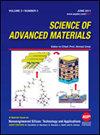Ubiquitin-Specific Protease 12-Mediated Stabilization of KDM1A Facilitates Ovarian Cancer Progression Through Activation of the Akt/mTOR/p70S6K Signaling Pathway
IF 0.9
4区 材料科学
引用次数: 0
Abstract
Ovarian cancer is still incurable, and new target genes are needed for further study. USP12 plays a crucial role in tumor progression, but its precise mechanism in ovarian cancer is not fully understood. RT-qPCR and western blot confirmed the expression level of USP12. The effect of USP12 on the proliferation, migration, and invasion of cells was examined through overexpression and silencing experiments, and key molecular signaling pathways were validated through western blotting. The relationship between USP12 and KDM1A expression was analyzed by Pearson correlation coefficient. Co-IP and western blot were used to conduct mechanistic studies. Mice xenografts were used to evaluate USP12’s function in vivo. Western blotting showed that USP12 is highly expressed and correlated with poor overall survival. USP12-overexpressing promoted cell processes in HO8910 cells, while USP12-silencing inhibited them in SKVO3 cells. KDM1A was significantly increased and had a positive relation with USP12 expression at the protein level. Co-IP experiments demonstrated that USP12 regulated KDM1A expression in a ubiquitin-dependent way. USP12 promoted ovarian cancer progress by stabilizing KDM1A, as shown by rescue experiments. in vivo studies showed that USP12-overexpressing promoted tumor growth and USP12-silencing inhibited it. Our results demonstrated that USP12 stabilized KDM1A to promote ovarian cancer progress via the Akt/mTOR/p70S6K signaling pathway, suggesting a new therapeutic target for ovarian cancer.泛素特异性蛋白酶12介导的KDM1A稳定通过激活Akt/mTOR/p70S6K信号通路促进卵巢癌症进展
癌症仍然无法治愈,需要新的靶基因进行进一步研究。USP12在肿瘤进展中起着至关重要的作用,但其在卵巢癌症中的确切机制尚不完全清楚。RT-qPCR和蛋白质印迹证实了USP12的表达水平。通过过表达和沉默实验检测了USP12对细胞增殖、迁移和侵袭的影响,并通过蛋白质印迹验证了关键分子信号通路。用Pearson相关系数分析USP12与KDM1A表达的关系。Co-IP和蛋白质印迹用于进行机理研究。小鼠异种移植物用于评估USP12在体内的功能。Western印迹显示USP12高度表达并且与较差的总生存率相关。USP12过表达促进了HO8910细胞中的细胞过程,而USP12沉默抑制了SKVO3细胞中的过程。KDM1A显著增加,并且在蛋白质水平上与USP12的表达呈正相关。Co-IP实验表明,USP12以泛素依赖的方式调节KDM1A的表达。如挽救实验所示,USP12通过稳定KDM1A促进了卵巢癌症的进展。体内研究表明,USP12过表达促进了肿瘤生长,而USP12沉默抑制了肿瘤生长。我们的研究结果表明,USP112通过Akt/mTOR/p70S6K信号通路稳定了KDM1A,促进了卵巢癌症的进展,为卵巢癌症提供了新的治疗靶点。
本文章由计算机程序翻译,如有差异,请以英文原文为准。
求助全文
约1分钟内获得全文
求助全文
来源期刊

Science of Advanced Materials
NANOSCIENCE & NANOTECHNOLOGY-MATERIALS SCIENCE, MULTIDISCIPLINARY
自引率
11.10%
发文量
98
审稿时长
4.4 months
 求助内容:
求助内容: 应助结果提醒方式:
应助结果提醒方式:


